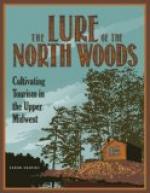He filled the glasses and with a few happy words wished Agatha success. She thanked him and afterwards stood up, very straight but silent, and with her eyes shining softly lifted her glass above her head. The others lifted theirs, in grave quietness, for they knew what she meant. The pioneers touch the ridge-pole of the tent, or the roof-tree of the shack, when they drink to the memory of comrades who have gone out on the last lone trail. But George’s look was troubled and his hand shook.
“He made good,” he said, and added, when they had drunk and Farnam refilled the glasses: “Here’s to the man who helped you prove it; the man who did my job!”
Mrs. Farnam studied Agatha and noted the softness of her look. Then she took the girl away and some time afterwards, when they were talking in her room, remarked: “There’s an obvious end to your romance, my dear. I suppose you’re going to marry Thirlwell?”
Agatha blushed, but gave her a steady glance. “He has not asked me.”
Mrs. Farnam pondered this and then made a sign of understanding. “I think I see; the man is white, although perhaps he’s foolishly proud. In fact, I imagine he’s worth one’s taking some trouble about—”
She stopped, seeing Agatha’s frown, and then resumed with a smile: “No; I’m not going to meddle! It’s better to wait. He’s a man, after all; you really have some charm, and human nature’s strong.”
CHAPTER XXX
A CHANGE OF LUCK
Scott met George at Montreal, and after spending some days there left for New York. When he stated the time of his return, George sent for Agatha and in the evening they went to meet him at the Grand Trunk Station. As they walked down the hill and by the Cathedral, Agatha felt excited. She had soon discovered that it was one thing to find a silver vein and another to raise the capital one required to open up the mine and refine the ore. The cost of these operations, as calculated by Scott, seemed enormous, and people rich enough to help either wanted the largest share of the profit or were frankly skeptical. George had got promises of some support, but much depended on the result of Scott’s visit to his wealthy friends.
It was dark when they walked up and down outside the platform gates; the train was late, and Agatha tried to control her nervous impatience. She could trust George’s judgment about money matters and she liked Scott, but she had got a habit of looking to Thirlwell when difficulties must be met, and he could not help her now. He was in the North, where winter would soon begin, doing her work with drill and giant powder. It was good work that demanded strength and courage and knowledge of Nature’s laws; she would have liked to have been there with him, instead of in the city where one must grapple with commercial subtleties.
By and by a bell tolled, there was a harsh rattle as the cars rolled in, and a few moments later Scott pushed through the crowd at the gate. Agatha went to meet him under a big lamp and saw by his look that he had been successful.




